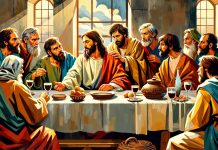I am not an expert on the phenomenon of death. But like all of us, I have to live in its shadow, and watch the restlessness and greed it causes. The same gloomy reports that circle the planet also reach me. I feel especially conscious of this as COVID-19 claims its first victims in my country.
In the context of this new normal, which will most likely last indefinitely, we need to reinvest in positive thinking.We also need to invest our frail energies into the search for meaning. In a situation such as this, I find myself reflecting on what helps me keep my temper and maintain my love for life, and I realise that I have gained assurance through an understanding of death from a biblical, Christian perspective. I will note three more or less well-known insights one can gain from this perspective, in the hope that they will be useful to others who are searching for meaning in these troubling times.
An enemy… and sometimes an ally
Death has imposed its notoriety through fear. It has spread the chilling reality of separation everywhere, uprooting relationships between loved ones, friends, and acquaintances. The anxiety it generates does not so much come from the idea that others can no longer be there for us, but from the thought that we could have given more happiness to those around us while they were with us. Death also causes us to shudder to think of the disappearance of something we usually consider normal and natural: time. The time to dream and fulfill great dreams, to discover and reach high ideals disappears. In short, death stops the possibility of becoming better, more moral, and more useful.
But as curious as it may seem, death is sometimes an ally. At least, this is the claim of many who are going through intense and prolonged suffering. They see its only positive element: it shortens the agony of dying. Martyrs throughout history have shown this. Or, moving closer to home, my grandfather’s final cries are another example. When the darkness of death enveloped him, he asked God to shorten the suffering. His request was heard, and he passed swiftly and painlessly. When I returned to my grandfather’s house to pay my last respects to him, he was waiting for me with a smile on his cold face. Then I understood better the second beatitude of Revelation*: “Then I heard a voice from heaven saying to me, ‘Write: “Blessed are the dead who die in the Lord from now on.” ‘Yes,’ says the Spirit, ‘that they may rest from their labors, and their works follow them.'” (Revelation 14:13).
Not one, but two
Probably the least commonly known thing about death is that we face not just one, but two deaths. That is what Jesus taught: “Do not be afraid of those who kill the body but cannot kill the soul; but rather fear him which is able to destroy both soul and body in hell” (Matthew 10:28). The first death comes as a result of old age, illness, accidents, calamities, and so on. Their effect is physical death, and means the cessation of life’s functions, mind and body. For this reason, Bible writers compare it to sleep, with the dead “knowing nothing” and never having “a share in all that is done under the sun” (Ecclesiastes 9: 5–6). The good news is that the first death is overcome by the first resurrection, or “resurrection of the righteous.” Those who have trusted in God are brought back to life to spend the rest of eternity in the company of Jesus.
The second death is the result of denying the existence of eternity. It is caused by God Himself, and salvation from it comes through the second resurrection—the resurrected having the Last Judgment. On this occasion, they are given a righteous reward, according to their deeds. The punishment for the unrighteous is compared to “Gehenna,” or “pond of fire,” and in it, more than the fire’s torment, its true terror is the abyss of separation from God, the Source of life. This shocking reality was immortalized in the words of Jesus on the cross: “My God, my God, why have you forsaken me?” (Matthew 27:46). The sad news is that there is no resurrection from the second death, and hence, the fear which Jesus experienced on the cross.
Why I am not afraid
I am not afraid of death, because Jesus has defeated it. He also sent us this message: “Blessed and holy are those who have the first resurrection! The second death has no power over them” (Revelation 20: 6). The fear of death only grips me when I contemplate the thought that it can come suddenly, spontaneously, and instantly. Even so—we are still forever carved into His palms! But, one day, when I am once again able hug, smile, appreciate, caress, and forgive those I loved on Earth, I am enveloped by the euphoria of that moment, the lucid understanding that I am alive! There is still a dreaming, flying, pulsating happiness for us to grasp: to resemble Him. This is the meaning of life, though lived in the shadow of death.
Daniel Olariu is a doctoral student in the Bible Department of the Hebrew University of Jerusalem.
*Revelation is the last book in the Bible, and contains a total of seven beatitudes. In addition to the happiness quoted above, the others are found in the following references: 1:3; 16:15; 19:9; 20:6; 22:7, 14.



















